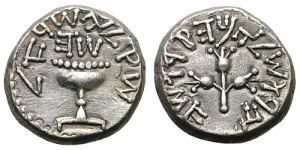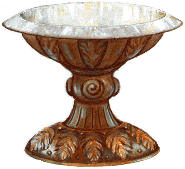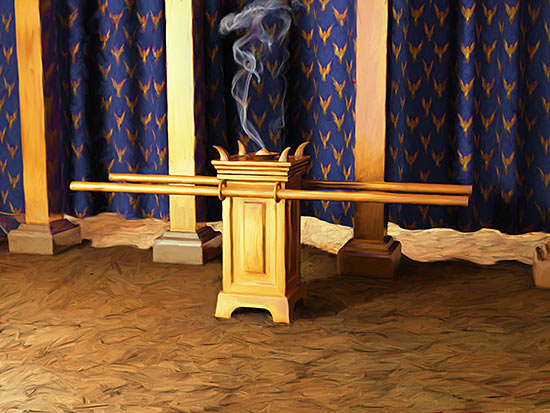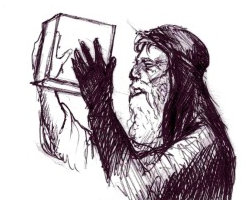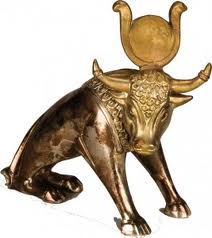כי תשא
Parshat Ki Tisa
Exodus 30:11-34:35

And YaHuWaH spoke to Mosheh, saying, “When you take the census of the children of Yisrael to register them, then each one shall give an atonement for his life to YaHuWaH, when you register them, so that there is no plague among them when you register them. – Shemoth (Exodus) 30:11,12
This portion of the Torah begins with a contribution that is to be collected for the Mikdash (Sanctuary/ tabernacle). כי תשא Ki Tisa literally mean “because/when you take.” The contribution is to be taken of all who would be registered which were only males who were over the age of twenty. Each life was ransomed by the cost of half a shekel. The rich were not to pay additional and the poor could not pay less. This contribution is often called Kesef haKippurim or “money of atonement.” A shekel is not exactly “money” by today’s standards; it is actually a measurement of silver. Silver and gold were the only currencies used in Scriptural times except for bartering.
The silver was melted down to create one hundred adanim or sockets used to hold the pillars of the Mishkan (dwelling/tabernacle) in place. Unlike the fourteen items required for the Tabernacle that were all voluntarily given, the half shekel is collected by all those registered in the “census.”
(silver sockets can be seen at the bottom of the wall)
After this collection, YaHuWaH commands for additional elements for his dwelling place to be built and gives the specific instructions.
Kiyyor Nechoshet כִּיֹּור נְחֹשֶׁת
The Kiyyor Nechoshet is a very large bronze basin used by the Kohanim (priests) to wash their hands and feet before serving in the Tabernacle. YaHuWaH commands that they must wash their hands and feet before serving in his dwelling place or else they will die!
Shemen Mishcat Qodesh שֶׁמֶן מִשְׁחַת־קֹדֶשׁ
Shemen Mishacat Qodesh is the “Set apart Anointing oil.”
It is to be made of “choice spices”.
five hundred sheqels of liquid myrrh,
half as much – two hundred and fifty – of sweet-smelling cinnamon,
two hundred and fifty of sweet-smelling cane (qanah bosem),
five hundred of cassia, according to the sheqel of the set-apart place,
a hin of olive oil.
The root word of Shemen meaning oil, is Shem which is Name! This is why the Song of Shlomo (Solomon) states “your NAME is OIL poured for therefore the virgins love you” and in his writings of Proverbs states “a great NAME is better than OIL.”
The word Mishcah which means anointing gives us the word Mashyach often translated “Messiah” but literally means “anointed.’ All the utensils including the Ark of The Covenant were to be anointed along with Aharon and his sons the Priests (Kohanim). Later when Yisrael would choose to have a King (Melech) he would be anointed as well. The Messiah is called “Anointed” because he will be anointed with this qodesh (set apart) oil just as Dawid his ancestor was.
YaHuWaH commands that this oil be the work of a perfumer and that no one should make any like it for their own use! Anyone who makes or uses this oil in a common way will be cut off from his or her people.
Qetoret קְטֹרֶת
Qetoret is incense that is to be burned upon the altar is made up of choice ingredients.
And YaHuWaH said to Mushah, “Take sweet spices:fragrant gum and cinnamon and galbanam, and clear frankincense with these sweet spices, all in equal amounts. “Then you shall make of these an incense, a compound, work of a perfumer, salted, clean, set-apart.
This incense is only to be used in service to YaHuWaH in the Mishkan (dwelling place). No one was to make incense like the qodesh ketoret, if they did that person would be cut off from his or her people.
After having described the Mishkan (dwelling place) and all of it’s components and utensils, YaHuWaH designates those who will be in charge of the construction.
Betsal’el בְּצַלְאֵל and Ohoilab אָהֳלִיאָב
“See, I have called by name Betsal’el son of Uri, son of Hur, of the tribe of Yahudah,and I have filled him with the Spirit (ruwach) of Elohim in wisdom, and in understanding, and in knowledge, and in all work, to make designs for work in gold, and in silver, and in bronze,and in cutting stones for setting, and in carving wood, and to work in all work.
“And I, look I have appointed with him Oholiab son of Achisamak, of the tribe of Dan. And I have put wisdom in the hearts of everyone who is wise-hearted, and they shall make all that I have commanded you.”
Betsal’el is from the royal tribe of Yahuwdah from which the Anointed (Mashyach) ruler of Yashar’al (Yisrael) shall arise. His name means “In the shadow of Aluahym (Elohim)” and his Father’s name Uri means “fiery.” Oholiab was from the tribe of Dan which means Judge. Oholiab’s name means “tent of father.” They were in charge of the construction of the entire mishkan (dwelling place). They were also in charge of the garments for the Kohanim, the oil and the incense
After giving these instructions YaHuWaH again declares the importance of his Shabbath (Sabbath).
HaShabbath הַשַּׁבָּת
“And you, speak to the children of Yisrael, saying, ‘My Sabbaths you are to guard, by all means, for it is a sign between Me and you throughout your generations, to know that I, YaHuWaH, am setting you apart.”
He goes on to say that any who break the Shabbath or profane it are to be put to death! YaHuWaH states twice that the Shabbath is to be observed forever and that work is to be done every six days but every seventh day is the Shabbath. YaHuWaH declares that the Shabbath is an אוֹת oth meaning sign forever between himself and his people.
Luchot לֻחֹת
Luchot is often translated “tablets.” YaHuWaH provided “luchot” with the “asar debrim” ( ten words) which were then given to Mosheh (Mushah) as a sign of the covenant YaHuWaH made with his people. The tablets were written with the very “finger of Elohim” and given to Mosheh on the mountain. YaHuWaH appeared to the elders in a previous Torah portion and beneath his feet was a Sapphire pavement. We also know that YaHuWaH’s throne is made of beautiful blue Sapphire. The two Luchot (tablets) were written on beautiful sapphire stone.
Shemoth (Exodus) 32:15And Mushah turned and went down from the mountain, and in his hand were the two tablets of the Witness, tablets written on both their sides, written on the one and on the other. 16And the tablets were the work of Aluahym (Elohim), and the writing was the writing of Aluahym (Elohim) engraved on the tablets.
The words of the “Witness” were written by YaHuWaH’s “finger.” The words were written through one side all the way through the other making the words viewable from all angles of the tablets.
While YaHuWaH is gifting (natan) Mushah with the two tablets of stone on the Mountain and revealing all the matters of the Mishkan, the people begin to grow restless.
And when the people saw that Mushah was so long in coming down from the mountain, the people gathered together to Aharon, and said to him, “Arise, make us mighty ones who go before us. For this Mushah, the man who brought us up out of the land of Mitsrayim, we do not know what has become of him.”
And Aharon said to them, “Take off the golden earrings which are in the ears of your wives, your sons, and your daughters, and bring them to me.”
Aharon builds the golden calf for the people and fastens an altar declaring “Tomorrow is a feast unto YaHuWaH!” This was an abomination to the qodesh Torah that tells us we should never make for ourselves idols. Aharon may have been prolonging the abomination of sacrifice by declaring “tomorrow”, perhaps in hope Mushah would come down soon. Though YaHuWaH knew what these people were doing down below and how they had defiled themselves, he “gave” Mushah the tablets, or literally “gifted” him with not only costly stones but with the perfect Torah of Truth. Any Sovereign Ruler who had made covenant or treaty with a people who broke that covenant would be destroyed. Yet YaHuWaH gifts them with truth to set them free from their sins!
In Mitsrayim (Egypt) cows, bulls and their calfs were worshipped as deities. Today various pagan religions such as Hinduism continue to worship these animals.
Shemoth (Exodus) 32:6And they rose early on the next day, and offered burnt offerings, and brought peace offerings. And the people sat down to eat and drink, and rose up to play.7And YaHuWaH said to Mosheh, “Go, get down! For your people whom you brought out of the land of Mitsrayim have corrupted themselves.
YaHuWaH was going to destroy the people and make of Mosheh a great nation until Mosheh interceded on their behalf. Mosheh repeated the covenants made with Abraham, Yitshaq and Yaacob and YaHuWaH relented from destroying his people.
Shemoth (Exodus) 32:17And Yahuwshuwa heard the noise of the people as they shouted and he said to Mushah, “A noise of battle in the camp!”18 But he said, “It is not the sound of those who shout of might, nor is it the sound of those who cry out in weakness, but the sound of singing that I hear.”19And it came to be, as soon as he came near the camp, that he saw the calf and the dancing. And Mushah’s displeasure burned, and he threw the tablets out of his hands and broke them at the foot of the mountain.
Mosheh (Mushah) then took the idol and burned it up, ground it into pieces and made the nation of Yashar’al (Yisrael) drink it. It is said that the water turned red like blood as both a reminder of the covenant but also a reminder of the plague of blood on Mitsrayim. The worship of cows was commonplace in Mitsrayim and YaHuWaH had already judged and defeated these idols. Mosheh (Mushah) called out “all who are for YaHuWaH come to me” and all the tribe of Lewi came to him and they slew 3,000 of the ringleaders who worshiped the calf. Mosheh (Mushah) then went back up the mountain to atone for their sins.
Shemoth (Exodus) 32:32“And now, if You would forgive their sin, but if not, please blot me out of Your book which You have written.”33And YaHuWaH said to Mushah, “Whoever has sinned against Me, I blot him out of My book. 34“And now, go, lead the people to the place of which I have spoken to you. See, My Messenger goes before you. And in the day of My visitation I shall visit their sin upon them.” 35And YaHuWaH plagued the people because they made the calf, which Aharon made.
From that moment YaHuWaH told Mushah that he would send his Malak (Messenger) to lead his people to the Promised Land. However YaHuWaH stated that he would not be coming into the land with the children of Yisrael. YaHuWaH commanded that Yisrael take off all their ornaments so he could decide what to do with them. When Mosheh came down the mountain and pitched his tent outside the camp because it was defiled. He referred to his tent as the tent of meeting. Mushah’s tent would serve as a temporary “tent of meeting” until the actual Mishkan (dwelling place) was built.. When Mosheh would go to his tent all of the children of Yashar’al (Yisrael) watched. There the pillar of cloud came to the entrance of the tent so that YaHuWaH could meet with him.
Shemoth (Exodus) 33:10And all the people saw the column of cloud standing at the Tent door, and all the people rose and bowed themselves, each one at the door of his tent.11Thus YaHuWaH spoke to Mosheh face to face, as a man speaks to his friend. And he would return to the camp, but his servant Yahuwshuwa son of Nun, a young man, did not leave the Tent.
YaHuWaH then decides that his presence will indeed go with his people because Mushah found favor in his eyes. After this promise YaHuWaH makes that his presence will indeed go with his people, Mushah asks for YaHuWaH to show him his kabod or esteem.
Shemoth (Exodus) 33:19 And He said, “I shall cause all My goodness to pass before you, and I shall proclaim the Name of YaHuWaH before you. And I shall favour him whom I favour, and shall have compassion on him whom I have compassion.”20 But He said, “You are unable to see My face, for no man does see Me and live.”21And YaHuWaH said, “See, there is a place with Me! And you shall stand on the rock.22 “And it shall be, while My esteem passes by, that I shall put you in the cleft of the rock and cover you with My hand while I pass by.23“Then I shall take away My hand and you shall see My back, but My face shall not be seen.”
Though the Torah says Mosheh spoke with YaHuWaH “face to face” as one speaks to a friend, Mosheh could not see the face of YaHuWaH and live. YaHuWaH could only make himself appear in ways that filtered his true esteem and Mosheh knew this.
Shemoth (Exodus) 34: And YaHuWaH said to Mushah, “Cut two tablets of stone like the first ones, and I shall write on these tablets the Words that were on the first tablets which you broke.2“And be ready in the morning. Then you shall come up in the morning to Mount Sinai, and present yourself to Me there on the top of the mountain.3 “And let no man come up with you, and let no man be seen in all the mountain, and let not even the flock or the herd feed in front of that mountain.”
Mushah went back up the mountain, this time with the two tablets he had hewn out.
Shemoth (Exodus) 34:5 And YaHuWaH came down in the cloud and stood with him there, and proclaimed the Name, YaHuWaH.6And YaHuWaH passed before him and proclaimed, “YaHuWaH, YaHuWaH, an El compassionate and showing favour, patient, and great in kindness and truth,7watching over kindness for thousands, forgiving crookedness and transgression and sin, but by no means leaving unpunished, visiting the crookedness of the fathers upon the children and the children’s children to the third and the fourth generation.”
Yod Heh Waw Heh (right to left) in Paleo Hebrew, pronounced YaHuWaH
The previous verses are usually referenced as the thirteen attributes of YaHuWaH’s Name! YaHuWaH proclaimed his Name, his attributes and then renewed the covenant he made with his people! He warns Mosheh (Mushah) that the people must drive out the inhabitants of the promised land, break their altars, their pillars and their sacred trees (asherim). Again he warns them, do not make an idol for yourselves to bow to. He reiterates the importance of remembering to keep Unleavened Bread, Shabbath and the dedication of the first-born. Again Mosheh (Mushah) was on the mountain forty days and forty nights, he ate no bread and drank no water. When Mosheh (Mushah) receives the two tablets with the ten words written in stone yet again he descends down the mountain. Mosheh’s skin was shining from the presence of YaHuWaH, insomuch that the children of Israel feared to come near him. Mosheh commanded the children of Yisrael all that YaHuWaH had taught him on the mountain. Thus the broken covenant is renewed, a foreshadowing of the renewed covenant (brit chadasha) prophesied by YeremiYAHUW (Jeremiah) and instituted through Messiah Yahuwshuwa.
Shemoth (Exodus) 34:33And when Mushah ended speaking with them, he put a veil on his face.34But whenever Mushah went in before YaHuWaH to speak with Him, he would remove the veil until he came out. And when he came out he spoke to the children of Yashar’al what he had been commanded,35 and the children of Yashar’al would see the face of Mushah, that the skin of Mushah’s face shone, and Mushah would put the veil on his face again, until he went in to speak with Him.
When Mosheh was not teaching Torah he would cover his face in the presence of his people. He covered his face with his Tallit, which means “little tent” and has been called a “prayer shawl.”
YaHuWaH revealed himself to Mushah through his Malak (Messenger). We know that this Malak (Messenger) is also the Debar (word) of YaHuWaH! When Mushah spoke to YaHuWaH face to face as one speaks to his friend, he was speaking to the Malak. Mushah wanted to see all of YaHuWaH’s esteem but is told no man can see his face and live. However Torah teaches that Abraham, Yitshaq and Yaacob all saw YaHuWaH! Yahuwshuwa our Messiah (Mashyach) told us no man has seen the Father, it was the only brought forth Ben (son) who declared him. Yahuwshuwa is the one to be anointed with the qodesh oil, he is the true mediator of the covenant. Even at the mount of transfiguration when Mushah and EliYAHUW appeared with him it says his face shown like the sun.


